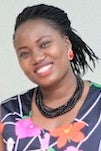 Doyin Adeoye sought out Metcalf Institute’s 18th Annual Science Immersion Workshop for Journalists with one goal in mind. “I wanted to learn more about the science behind the environmental issues in Africa,” said Adeoye, environmental reporter for the Nigerian Tribune, who began writing about the environment just four months before she was selected to attend the week-long workshop. “There is no way you can tell a story to your audience if you can’t understand it yourself.”
Doyin Adeoye sought out Metcalf Institute’s 18th Annual Science Immersion Workshop for Journalists with one goal in mind. “I wanted to learn more about the science behind the environmental issues in Africa,” said Adeoye, environmental reporter for the Nigerian Tribune, who began writing about the environment just four months before she was selected to attend the week-long workshop. “There is no way you can tell a story to your audience if you can’t understand it yourself.”
Growing up in West Africa’s largest city, Ibadan, Adeoye earned a B.S. in sociology and anthropology from the Obafemi Awolowo University, Ile-Ife, Osun State, Nigeria. Her lifelong love of writing eventually led her to a career in journalism covering education and entertainment. “Since I was a child of five or six, I felt the need to write,” Adeoye recounts. “I’m on the job now and I’m loving it.”
Despite being new to the environment beat, Adeoye arrived at the Metcalf workshop with quite a bit of environmental reporting under her belt. She covered a variety of topics in Southern and West Africa including ozone layer depletion, deforestation, global warming, and habitat conservation. Her assignments sparked a passion that led to her to focus, full-time, on the unique environmental issues facing the world’s second most populous continent. “The environment is underreported in Africa and people need to know the stories,” explained Adeoye. “The concerns are quite different here.”
As Adeoye worked to expand the Nigerian Tribune’s coverage of environmental issues through her reporting, she struggled to decipher complex studies published in scientific journals. “As a journalist, it’s not an easy thing to interpret scientific articles for an audience,” she noted. Metcalf’s workshop helped Adeoye overcome that obstacle by giving her the tools to effectively translate science journals and providing her with a better understanding of how scientists conduct research.
At Metcalf, “I learned how to break down what the scientists were saying and deliver it to the audience in a way that they would be able to understand,” reflected Adeoye.
As a Fellow, she connected with researchers studying changing fish stocks aboard a research vessel in Narragansett Bay, visited an urban wastewater treatment plant and lab and discussed water quality management, and learned how to “think like a scientist” by observing the effects of sea level rise on coastal wetlands in historic Newport, Rhode Island. “It was a once in a lifetime experience,” shared Adeoye.
After having the opportunity to talk with and ask questions of top scientists and build comradery with other journalists at the workshop, Adeoye said she approaches environmental stories with much greater confidence.
“In every major way the workshop has changed my reporting.”
Read more alumni profiles